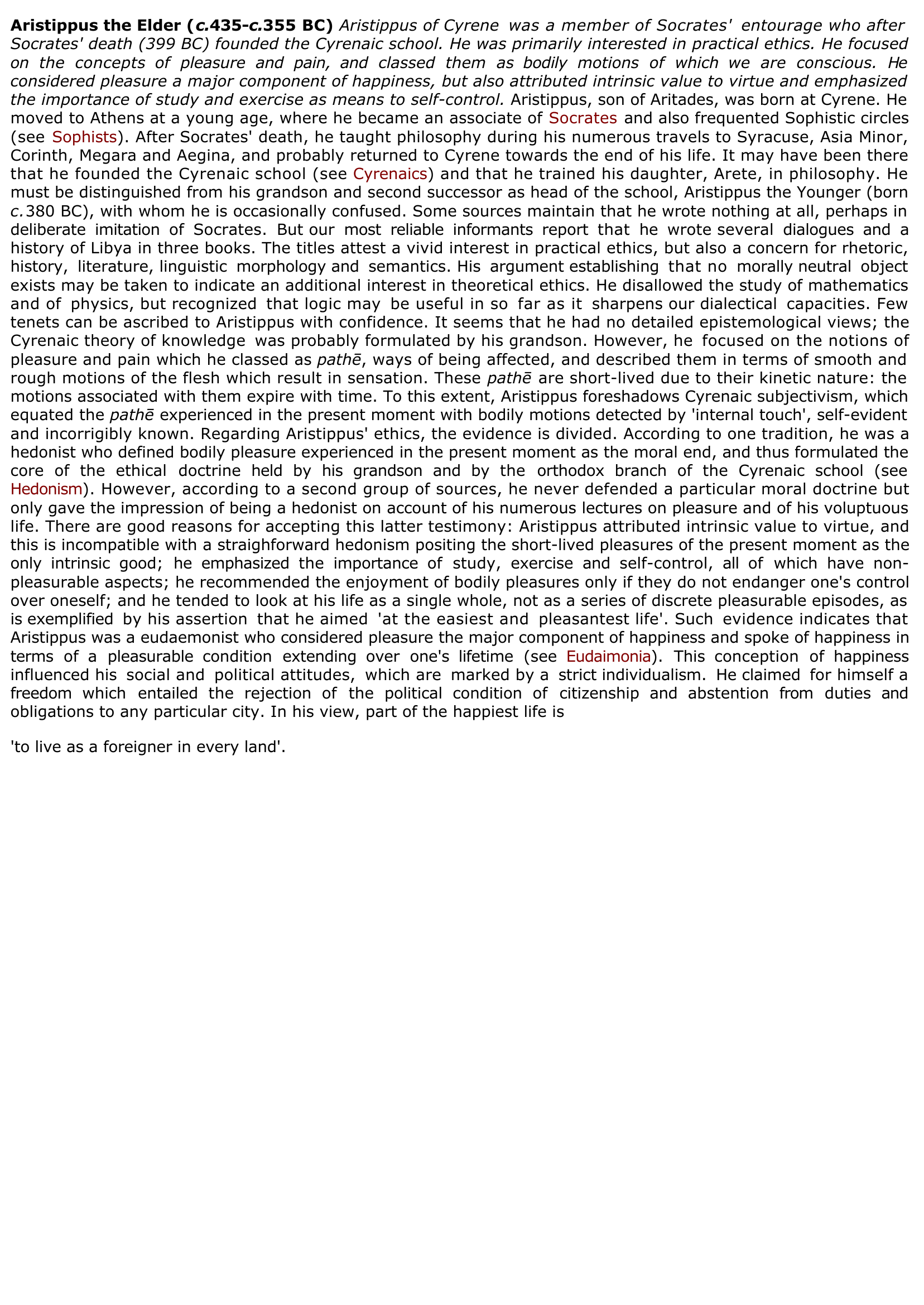Aristippus the Elder
Extrait du document
Aristippus of Cyrene was a member of Socrates' entourage who after Socrates' death (399 BC) founded the Cyrenaic school. He was primarily interested in practical ethics. He focused on the concepts of pleasure and pain, and classed them as bodily motions of which we are conscious. He considered pleasure a major component of happiness, but also attributed intrinsic value to virtue and emphasized the importance of study and exercise as means to self-control. Aristippus, son of Aritades, was born at Cyrene. He moved to Athens at a young age, where he became an associate of Socrates and also frequented Sophistic circles (see Sophists). After Socrates' death, he taught philosophy during his numerous travels to Syracuse, Asia Minor, Corinth, Megara and Aegina, and probably returned to Cyrene towards the end of his life. It may have been there that he founded the Cyrenaic school and that he trained his daughter, Arete, in philosophy. He must be distinguished from his grandson and second successor as head of the school, Aristippus the Younger (born c.380 BC), with whom he is occasionally confused.
«
Aristippus the Elder (c.435-c.355 BC) Aristippus of Cyrene was a member of Socrates' entourage who after
Socrates' death (399 BC) founded the Cyrenaic school.
He was primarily interested in practical ethics.
He focused
on the concepts of pleasure and pain, and classed them as bodily motions of which we are conscious.
He
considered pleasure a major component of happiness, but also attributed intrinsic value to virtue and emphasized
the importance of study and exercise as means to self-control.
Aristippus, son of Aritades, was born at Cyrene.
He
moved to Athens at a young age, where he became an associate of Socrates and also frequented Sophistic circles
(see Sophists).
After Socrates' death, he taught philosophy during his numerous travels to Syracuse, Asia Minor,
Corinth, Megara and Aegina, and probably returned to Cyrene towards the end of his life.
It may have been there
that he founded the Cyrenaic school (see Cyrenaics) and that he trained his daughter, Arete, in philosophy.
He
must be distinguished from his grandson and second successor as head of the school, Aristippus the Younger (born
c.380 BC), with whom he is occasionally confused.
Some sources maintain that he wrote nothing at all, perhaps in
deliberate imitation of Socrates.
But our most reliable informants report that he wrote several dialogues and a
history of Libya in three books.
The titles attest a vivid interest in practical ethics, but also a concern for rhetoric,
history, literature, linguistic morphology and semantics.
His argument establishing that no morally neutral object
exists may be taken to indicate an additional interest in theoretical ethics.
He disallowed the study of mathematics
and of physics, but recognized that logic may be useful in so far as it sharpens our dialectical capacities.
Few
tenets can be ascribed to Aristippus with confidence.
It seems that he had no detailed epistemological views; the
Cyrenaic theory of knowledge was probably formulated by his grandson.
However, he focused on the notions of
pleasure and pain which he classed as pathē, ways of being affected, and described them in terms of smooth and
rough motions of the flesh which result in sensation.
These pathē are short-lived due to their kinetic nature: the
motions associated with them expire with time.
To this extent, Aristippus foreshadows Cyrenaic subjectivism, which
equated the pathē experienced in the present moment with bodily motions detected by 'internal touch', self-evident
and incorrigibly known.
Regarding Aristippus' ethics, the evidence is divided.
According to one tradition, he was a
hedonist who defined bodily pleasure experienced in the present moment as the moral end, and thus formulated the
core of the ethical doctrine held by his grandson and by the orthodox branch of the Cyrenaic school (see
Hedonism).
However, according to a second group of sources, he never defended a particular moral doctrine but
only gave the impression of being a hedonist on account of his numerous lectures on pleasure and of his voluptuous
life.
There are good reasons for accepting this latter testimony: Aristippus attributed intrinsic value to virtue, and
this is incompatible with a straighforward hedonism positing the short-lived pleasures of the present moment as the
only intrinsic good; he emphasized the importance of study, exercise and self-control, all of which have nonpleasurable aspects; he recommended the enjoyment of bodily pleasures only if they do not endanger one's control
over oneself; and he tended to look at his life as a single whole, not as a series of discrete pleasurable episodes, as
is exemplified by his assertion that he aimed 'at the easiest and pleasantest life'.
Such evidence indicates that
Aristippus was a eudaemonist who considered pleasure the major component of happiness and spoke of happiness in
terms of a pleasurable condition extending over one's lifetime (see Eudaimonia).
This conception of happiness
influenced his social and political attitudes, which are marked by a strict individualism.
He claimed for himself a
freedom which entailed the rejection of the political condition of citizenship and abstention from duties and
obligations to any particular city.
In his view, part of the happiest life is
'to live as a foreigner in every land'..
»
↓↓↓ APERÇU DU DOCUMENT ↓↓↓
Liens utiles
- The Buddha of suburbia
- the stolen generation
- Is there one side of the coin in the myth of the frontier?
- The impact of social media on our societies through the changes in lifestyles, diversity and human rights.
- The madness of laicity

































